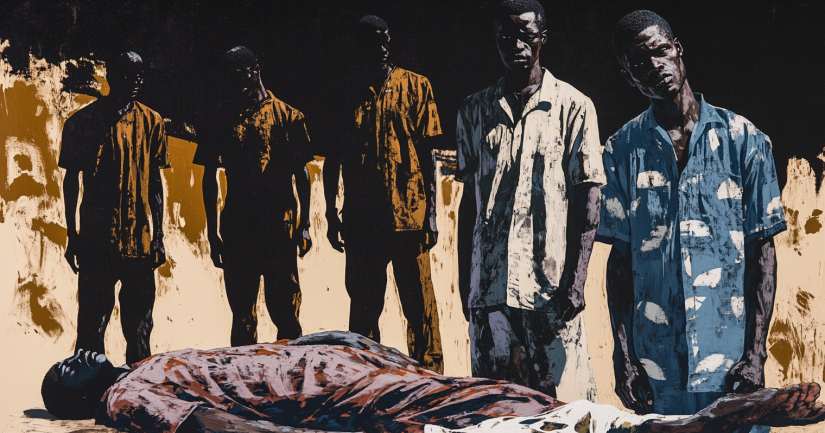
Dive into the significant revelations of Chapter 13 with our engaging Things Fall Apart Quiz. This quiz dives into Chapter 13, a pivotal segment in Chinua Achebe’s masterpiece. Here, you will explore themes of tradition, change, and the intricate web of Igbo society. As you progress, you will encounter the profound moments that define Okonkwo’s journey. Each question invites you to delve deeper into the rich tapestry of cultural nuances and personal struggles.
In this chapter, significant events shake the very foundations of the community. The quiz will guide you through these moments, helping you grasp their impact on the characters and the broader narrative. As you engage with the questions, you will discover the delicate balance between fate and free will, as well as the consequences of individual actions.
The story is reaching a turning point! Don’t miss what happens next move on to Things Fall Apart Chapter 14 Quiz. Need to look back at the previous chapter for clarity? Refresh your memory with Things Fall Apart Chapter 12 Quiz. And when you’re ready, put everything to the test with the Things Fall Apart Full Book Quiz.
Prepare to test your knowledge and enhance your understanding of this literary classic. Whether you’re revisiting the text or exploring it for the first time, this quiz offers a meaningful glimpse into the heart of Achebe’s world. Dive in and uncover the wisdom and complexity that makes Things Fall Apart a timeless tale.
Things Fall Apart Quizzes: Dive into Igbo culture and colonial impact …
What Happened – Things Fall Apart Chapter 13
In Chapter 13 of Things Fall Apart, a funeral is held for Ezeudu, a respected elder in Umuofia. The whole village gathers to honor him. Men beat drums and fire guns in his memory. The celebration is loud and lively, as was the custom for a warrior’s funeral.
During the ceremony, Okonkwo accidentally fires his gun. The bullet hits and kills Ezeudu’s sixteen-year-old son. This is considered a female crime, or an accident, which is less severe than a male crime. However, the Igbo law requires that Okonkwo and his family be punished.
The villagers gather at Okonkwo’s compound. They follow the traditional punishment for such a crime. They destroy his houses and kill his animals. This act cleanses the land from the crime. Okonkwo and his family must leave the village for seven years. They pack their belongings and go to Mbanta, Okonkwo’s motherland.
Okonkwo’s uncle, Uchendu, welcomes them in Mbanta. He gives them land to farm and a house to live in. The family starts their new life in exile. The events affect Okonkwo deeply, and he feels his life is falling apart. This chapter shows the harshness of Igbo customs and how quickly life can change.
Things Fall Apart Chapter 13 – Quotes
- “Umuofia has decided to kill him. The Oracle of the Hills and the Caves has pronounced it.” – {Okonkwo}, ‘Discusses the fate of Ikemefuna with other villagers, illustrating the power of tradition and prophecy.’
“His life had been ruled by a great passion—to become one of the lords of the clan.” – {Narrator}, ‘Reflects on Okonkwo’s deep-seated ambition and fear of failure.’
“Okonkwo’s gun had exploded and a piece of iron had pierced the boy’s heart.” – {Narrator}, ‘Describes the tragic accident at Ezeudu’s funeral, leading to Okonkwo’s exile.’
“It was the justice of the earth goddess, and they were merely her messengers.” – {Narrator}, ‘Explains the cultural belief in divine justice following the accidental killing.’
“The only course open to Okonkwo was to flee from the clan.” – {Narrator}, ‘Details the consequence Okonkwo must face after the accidental death, showcasing themes of fate and justice.’
“The crime was of two kinds, male and female.” – {Narrator}, ‘Highlights the Igbo belief system where crimes are categorized, underscoring the cultural context.’
Things Fall Apart Chapter 13 – FAQ
In Chapter 13 of Chinua Achebe’s Things Fall Apart, a tragic accident occurs during the funeral of Ezeudu, the oldest man in the village. Okonkwo’s gun accidentally goes off, killing Ezeudu’s son. This unforeseen event marks a turning point in the novel, leading to Okonkwo’s exile from Umuofia.
The community adheres to their traditional customs, which dictate that Okonkwo must be exiled for seven years as punishment for the inadvertent killing. The incident is deemed a female crime, or an offense committed unintentionally. Consequently, Okonkwo’s compound is destroyed, and his family is sent to his motherland, Mbanta.
Traditional customs play a crucial role in Chapter 13, as they dictate the consequences of Okonkwo’s actions. The community’s adherence to these customs underscores the importance of cultural norms and collective identity in Igbo society. Okonkwo’s exile reflects the community’s need to maintain balance and justice according to their beliefs.
Okonkwo is devastated by his exile, as it disrupts his aspirations and status within the community. Despite his outward resilience, the punishment is a significant blow to his pride and ambition. This chapter highlights his inner struggle and foreshadows the challenges he will face in rebuilding his life.
Chapter 13 emphasizes themes of fate, tradition, and the fragility of human endeavors. The accident at Ezeudu’s funeral serves as a reminder of the unpredictability of life and the powerful influence of cultural customs. It also illustrates the tension between individual desires and communal expectations, a central theme throughout the novel.
